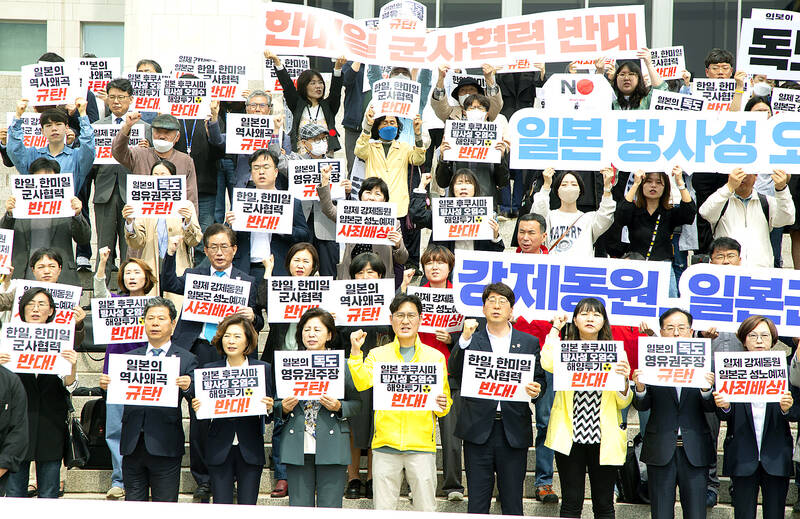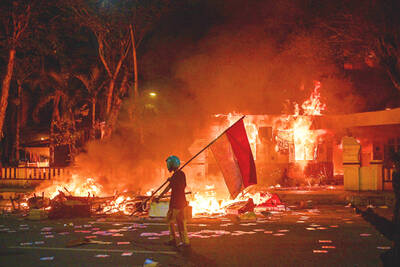In between talks on security and technology, the leaders of South Korea and Japan plan to unwind over a drink.
South Korean President Yoon Suk-yeol is preparing to share a “bomb shot” with Japanese Prime Minister Fumio Kishida over a casual dinner on Sunday.
The concoction, a combination of beer with South Korea’s national spirit soju, is a mainstay in South Korean dramas, and is often shared among colleagues and friends in the country to bond.

Photo: EPA-EFE
The meal is part of an official two-day summit in Seoul — the first in 12 years — meant to bolster ties between the US allies. Seen as a chance to restore shuttle diplomacy, the visit takes place ahead of a trilateral meeting between the US, South Korea and Japan during a G7 meeting in Hiroshima, Japan, later this month.
The relaxed dinner at Yoon’s presidential residence in Seoul is to showcase Korean cuisine. Yoon intends to serve charcoal-grilled meat, people familiar with the event said.
Korean rice wine would be offered throughout the meal, and high-level officials from Yoon’s ruling People Power Party suggest that bomb shots are “most likely” to follow.
The last such meeting was in October 2011, when then-Japanese prime minister Yoshihiko Noda visited Seoul for a summit with then-South Korean president Lee Myung-bak. Back then, marinated beef short ribs, soju and rice wine were on the menu at a restaurant in the ritzy Gangnam District.
The bilateral summit is part of a broader push to restore ties harmed by disputes in the past few years. The friction caused headaches for the White House, which wants the two countries to form a united front against North Korea.
The political rift is driven by questions of fair compensation after Japan forced Koreans to labor in Japanese mines and factories during the 1910-1945 colonial rule over the peninsula. The relationship worsened in 2019, when Japan removed South Korea from its preferential trading list, leading to reciprocal action.
Last month, South Korea added Japan back to its “white list” of trading partners, and Japan later announced it would do the same.

Australia has announced an agreement with the tiny Pacific nation Nauru enabling it to send hundreds of immigrants to the barren island. The deal affects more than 220 immigrants in Australia, including some convicted of serious crimes. Australian Minister of Home Affairs Tony Burke signed the memorandum of understanding on a visit to Nauru, the government said in a statement on Friday. “It contains undertakings for the proper treatment and long-term residence of people who have no legal right to stay in Australia, to be received in Nauru,” it said. “Australia will provide funding to underpin this arrangement and support Nauru’s long-term economic

‘NEO-NAZIS’: A minister described the rally as ‘spreading hate’ and ‘dividing our communities,’ adding that it had been organized and promoted by far-right groups Thousands of Australians joined anti-immigration rallies across the country yesterday that the center-left government condemned, saying they sought to spread hate and were linked to neo-Nazis. “March for Australia” rallies against immigration were held in Sydney, and other state capitals and regional centers, according to the group’s Web site. “Mass migration has torn at the bonds that held our communities together,” the Web site said. The group posted on X on Saturday that the rallies aimed to do “what the mainstream politicians never have the courage to do: demand an end to mass immigration.” The group also said it was concerned about culture,

ANGER: Unrest worsened after a taxi driver was killed by a police vehicle on Thursday, as protesters set alight government buildings across the nation Protests worsened overnight across major cities of Indonesia, far beyond the capital, Jakarta, as demonstrators defied Indonesian President Prabowo Subianto’s call for calm. The most serious unrest was seen in the eastern city of Makassar, while protests also unfolded in Bandung, Surabaya, Solo and Yogyakarta. By yesterday morning, crowds had dispersed in Jakarta. Troops patrolled the streets with tactical vehicles and helped civilians clear trash, although smoke was still rising in various protest sites. Three people died and five were injured in Makassar when protesters set fire to the regional parliament building during a plenary session on Friday evening, according to

CRACKDOWN: The Indonesian president vowed to clamp down on ‘treason and terrorism,’ while acceding to some protest demands to revoke lawmaker benefits Protests in Indonesia over rising living costs and inequality intensified overnight, prompting Indonesian President Prabowo Subianto to cancel a planned trip to China, while demonstrators reportedly targeted the homes of the finance minister and several lawmakers. Rioters entered Indonesian Minister of Finance Sri Mulyani Indrawati’s residence near Jakarta early yesterday, but were repelled by armed forces personnel, Kompas reported. Items were taken from the homes of lawmaker Ahmad Sahroni and two others, according to Detik.com. The reports of looting could not be independently verified, and the finance ministry has not responded to requests for comment. The protests were sparked by outrage over